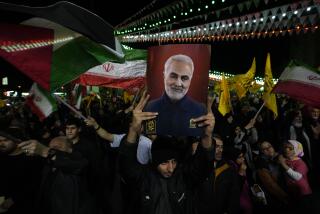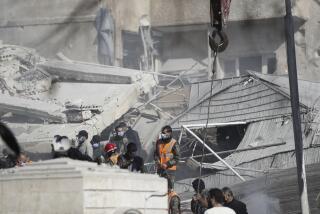Bomber Kills at Least Two in Iraq
- Share via
BAQUBAH, Iraq — As children walked to the school next door, a suicide bomber detonated a car laden with explosives Wednesday outside a police station here, killing at least two people and injuring dozens in the latest attack on symbols of authority in this country, Iraqi police said.
The assault came on a day when U.S. forces announced the capture near the city of Ramadi of former Baath Party leader Khamis Sirhan Mohammed. Ramadi is about 75 miles west of Baqubah in the so-called Sunni Triangle region, a stronghold of opposition to the U.S.-led occupation.
Mohammed was No. 54 on the Pentagon list of the 55 most-wanted Iraqis, and American Brig. Gen. Mark Kimmitt called him an “enabler for resistance attacks on Iraqi and coalition forces.”
American soldiers also detained four nephews of the most-wanted Iraqi, former Gen. Izzat Ibrahim, in the town of Samarra.
Kimmitt said Wednesday that attacks against coalition forces have declined to an average of 17 a day. The average had been double that before former President Saddam Hussein was captured by U.S. forces last month. Kimmitt did not have figures for attacks against Iraqi police and other officials whom American forces have put in control of much of the security apparatus here, including the station in Baqubah.
Members of the Iraqi Civil Defense Corps said they initially turned back the green Toyota Corona from the blockaded street outside a police station about 8:30 a.m. But the driver slipped through on a second attempt, they said, and slowed only slightly as sentries yelled for him to stop.
The driver gave a friendly smile and reached down under the dashboard. As the sentries opened fire, the car exploded, Sgt. Mahmoud Shaker said. He said the blast lifted him off his feet and shrapnel shredded his leg and arms.
U.S. officials gave a slightly different account, placing the death toll at five, and saying they believed a pre-set car bomb was used in the attack.
The assault infuriated police who staff the station and whose main job is not enforcing laws but rushing the sick and wounded to hospitals.
“I am so sad,” Shaker said from his hospital bed. “We have done nothing wrong to them. We are doing good for the people, trying to offer safety, and this is the result.”
The car detonated a few feet in front of the courtyard wall encircling the police station, which, except for a few strands of razor wire, was unprotected. The blast shattered windows in the station and in neighboring buildings, and sprayed schoolchildren with debris as they walked to classes at the secondary school next door.
Doctors at the local hospital said they treated 26 people, including a dozen children who suffered mostly minor abrasions. Two people, identified by witnesses as janitors who were cleaning the outside of the police station, died, the doctors said. American officials said the dead also included two Iraqi police and one member of the Civil Defense Corps.
“This is a cowardly attack that targeted an office that does a humanitarian job,” Iraqi police Col. Salam Omar said. “We transfer patients and pregnant women to hospitals.”
Also Wednesday, U.S. officials said tests on mortar shells discovered last week by Danish forces in southern Iraq showed no signs of chemical agents. Authorities initially had suspected that the shells held a blister agent from the Iran-Iraq war in the 1980s.
Ridding the Hussein government of nuclear, chemical and biological weapons was a stated goal of the Bush administration for the war against Iraq, but to date no such weapons have been found.
Meanwhile, Frank Ricciardone, the U.S. ambassador to the Philippines and one of the government’s leading Iraq experts, left Manila to return to Washington to become the new senior coordinator of the State Department’s Iraq policy, officials said.
Ricciardone will help fashion policy as the department assumes a greater role in Iraq this summer, when the Coalition Provisional Authority is scheduled to shut its doors. Ricciardone was Secretary of State Madeline Albright’s special coordinator for the transition of Iraq from 1999 to 2001.
A State Department spokesman said Ricciardone would help the government organize an Iraq “super office” at the State Department, even as diplomats organize the large new U.S. Embassy that is to be opened July 1.
A former U.S. intelligence official said Ricciardone is expected to have a large degree of autonomy within the department. The former official said that, significantly, Ricciardone had not been an advocate of Ahmad Chalabi, the Iraqi Governing Council member who has been supported by senior Pentagon officials.
*
Times staff writers Paul Richter in Washington and Alissa J. Rubin in Baghdad and Raheem Salman of The Times’ Baghdad Bureau contributed to this report.
More to Read
Sign up for Essential California
The most important California stories and recommendations in your inbox every morning.
You may occasionally receive promotional content from the Los Angeles Times.













